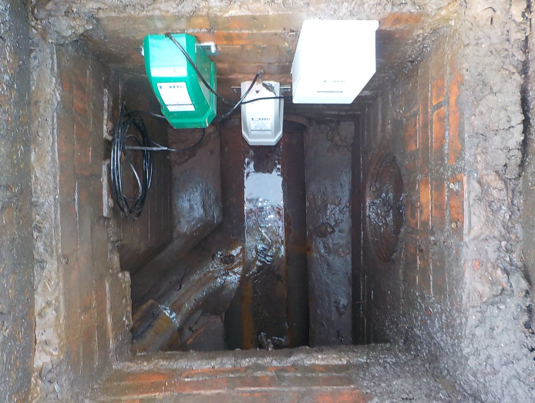Investment in Scottish Water’s intelligent asset base on its wastewater infrastructure, including remote sensors and data-driven insight, is set to improve its service to customers, protect the environment, reduce costs and assist in its journey towards net zero carbon emissions.
The early stages of investment of up to £100m over the next five years in its intelligent asset base – designed to use new technology to monitor their sewage pipes rather than rely on customers telling them when there is a problem – have indicated that the utility will be able to better predict and prevent wastewater issues before they impact customers and the environment.
Wastewater is a key focus of Scottish Water’s drive to introduce cost and efficiency savings via an ambitious transformation programme, with the objective of achieving net-zero carbon emissions by 2040.
Trials of the new technology have shown that it will give the company real-time insights into how its network is operating and enable it to be more proactive in how it responds to issues and to solve problems before customers and the environment are affected.

The technology is currently being trialled in four areas – Erskine, Inverness, Lossiemouth and East Calder – which have suffered from flooding and pollution events historically.
Scottish Water has placed sensors that detect the presence of blockages and has already used this data to avert potential Environmental Pollution Incidents (EPIs) and flooding of customers’ premises.
Using the learning from these four areas, Scottish Water intends to extend this intelligence into other areas which experience similar issues.
Similarly, at its wastewater treatment assets, a major challenge for the business is that there is little access to real-time data regarding the quality of treatment or the condition and performance of critical assets. As a result, maintenance is more responsive than predictive, energy consumption is higher than it could be, and asset life is potentially shortened.
The goal is to access new and existing operational data from across the infrastructure, securely connecting it via Internet of Things (IoT) sensors and other devices to provide near real-time data and reduce the reliance on site visits. This would enable considerable cost savings because 600 samples are gathered daily from across Scottish Water’s 1,800 treatment works.
This capability is being installed at 17 wastewater ‘exemplar’ treatment works. At the first one, Laighpark WWTW in Paisley, Scottish Water now has real-time final effluent compliance data which, together with real-time control and intervention, is helping to reduce risk of compliance breaches as well as reduce energy consumption across the site.
Condition sensors have also been installed on large assets such as pumps which, when they fail, can result in significant cost and pollution.
By monitoring vibration and temperature, Scottish Water maintenance teams can proactively intervene if the signals go outside ‘normal’ operating levels, avoiding the cost of failure and pollution while extending asset life.
Scottish Water has invested more than £5m in the wastewater ‘exemplar’ work and about £2m in the sensors in the network pilots so far.
Chris Toop, General Manager – Digital, said: “We are very encouraged by the early results coming through our pilot works. The innovative use of sensors and analytics in this way represents a much bigger shift towards predicting and preventing issues before they impact on our customers and environment – ensuring that vital services flow smoothly and efficiently.”
Joyce Gray, Wastewater Business Manager, added: “This is a complex programme of works and a critical part of our Digital Transformation journey, helping transform our wastewater business and drive a step-change in operational performance.
“It will allow us to make better operational decisions, be more efficient and to drive significant benefits, particularly in relation to energy consumption and responsive asset failures.”
Atos and Capgemini are our Digital Partners supporting Scottish Water in the provision of IT services and our Digital Transformation.
Neil Holland, Atos Client Partner Water, said: “Atos are delighted to be working with Scottish Water to help transform their Waste Water operations. Together we are already delivering game changing insights which are improving the management of the waste water network, avoiding blockage incidents and therefore protecting the environment and delivering world class services and value to the people of Scotland.”
Paul Haggerty, UK Head of Energy & Utilities at Capgemini, said: “Capgemini is proud to support Scottish Water to drive a step change in operational performance and carbon reduction in wastewater treatment
“Our wastewater exemplars programme leverages next generation technology with a focus on human centric design to support a digitally connected workforce and intelligent wastewater network. This in turn will deliver both value for customers and support Scottish Water’s net zero emissions roadmap”.
Scottish Water provides drinking water to 2.46 million households and 150,000 business customers. Every day, it supplies 1.34 billion litres of drinking water and takes away 847 million litres of waste water from customers’ properties for treatment before returning it to the environment.
The utility also clears about 36,000 blockages from its network every year. About 80% of these are caused by people flushing the wrong items, such as wet wipes, down toilets or pouring fats, oil and grease down sinks. These can cause sewers to block and wastewater to overflow into the environment or flood customers’ properties.
Wastewater handling and treatment is also highly energy-intensive, consuming 53% of the total energy Scottish Water uses and contributing 71% to Scottish Water’s carbon footprint.
This investment is over and above a package of investment in their wastewater system – from treatment works to Combined Sewer Overflows (CSOs) – worth half a billion pounds, that the company announced previously which underlined its commitment to protecting Scotland’s urban waters for decades to come.
In February 2022, Scottish Water also launched its nationwide Nature Calls campaign backed by a range of other organisations, including the Marine Conservation Society, Keep Scotland Beautiful and Zero Waste Scotland.
The campaign urges people to bin all wipes, and calls for a ban on wipes containing plastic, to help protect the environment.



